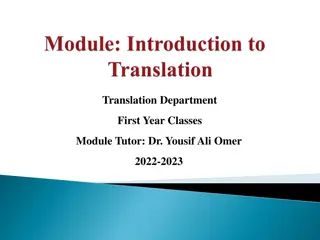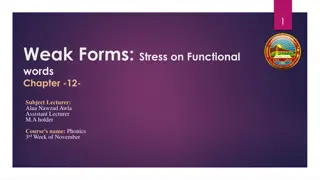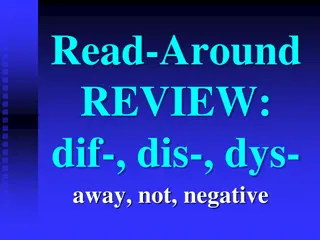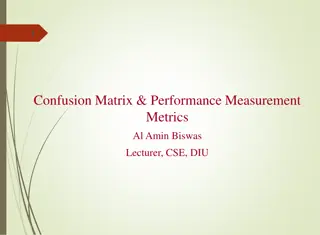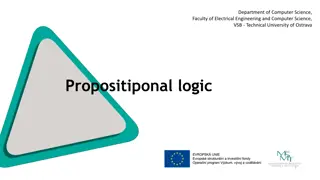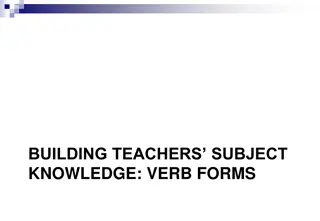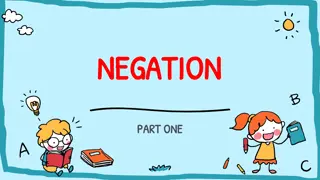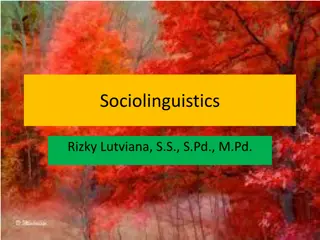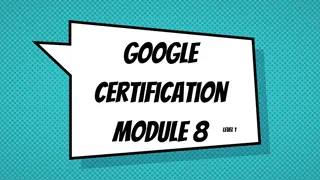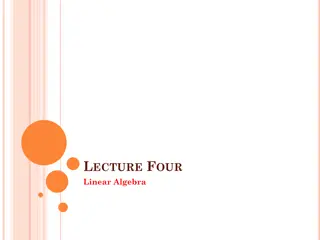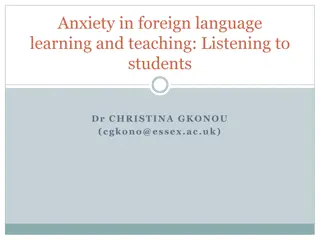Negative forms in Language
In this detailed guide, explore different types of negative forms in language, including using a word negative in form and meaning, examples of negations, antonyms, and the use of prefixes and suffixes with negative meanings. Discover how negation can impact the structure and meaning of sentences.
Download Presentation

Please find below an Image/Link to download the presentation.
The content on the website is provided AS IS for your information and personal use only. It may not be sold, licensed, or shared on other websites without obtaining consent from the author.If you encounter any issues during the download, it is possible that the publisher has removed the file from their server.
You are allowed to download the files provided on this website for personal or commercial use, subject to the condition that they are used lawfully. All files are the property of their respective owners.
The content on the website is provided AS IS for your information and personal use only. It may not be sold, licensed, or shared on other websites without obtaining consent from the author.
E N D
Presentation Transcript
NEGATION NEGATION PART TWO PART TWO
#02# #02# Using Using a word negative in form and meaning a word negative in form and meaning This This type of negation has to do with words type of negation has to do with words other than verbs. The negative element in this other than verbs. The negative element in this case is carried in case is carried in words. words.
Examples Examples NO NO THEY HAD THEY HAD NO NO IDEA WHAT WAS THEIR PRESENT. IDEA WHAT WAS THEIR PRESENT. NONE NONE NONE NONE OF US WON A TICKET TO RIHANA S CONCERT. OF US WON A TICKET TO RIHANA S CONCERT. NOBODY NOBODY NOBODY NOBODY CAME TO VISIT ME WHILE I WAS IN HOSPITAL. CAME TO VISIT ME WHILE I WAS IN HOSPITAL. NOTHING NOTHING THERE IS THERE IS NOTHING NOTHING WRONG WITH YOUR COOKING. WRONG WITH YOUR COOKING. NEITHER NEITHER NEITHER NEITHER OF THE CHILDREN SEEMED CONCERNED OF THE CHILDREN SEEMED CONCERNED ABOUT THE FLIGHT. ABOUT THE FLIGHT. NOWHERE NOWHERE I HAVE I HAVE NOWHERE NOWHERE ELSE TO GO. ELSE TO GO. NEVER NEVER HE HE NEVER NEVER LISTENS TO ME. LISTENS TO ME.
#03# #03# Using Using a word negative in a word negative in meaning meaning This This type of negation type of negation too has a connection with the too has a connection with the use of individual words since negation is encoded in the use of individual words since negation is encoded in the words themselves even though, the structure of the words themselves even though, the structure of the sentence may be positive. sentence may be positive. Positive Positive negative negative They They refused refused the offer. the offer. They They accepted accepted the offer. the offer.
Antonyms (Opposites) Antonyms (Opposites)
#04# #04# Using Using prefixes and suffixes prefixes and suffixes Prefixes Prefixes and added to the beginning or end of another word. They added to the beginning or end of another word. They are not words in their own right and cannot stand on are not words in their own right and cannot stand on their own in a sentence. their own in a sentence. Prefixes Prefixes and Suffixes Suffixes are sets of letters that are are sets of letters that are Suffixes Suffixes Change the form of the Change the form of the word. happi word. happiness Change the meaning of the Change the meaning of the word. word. dis dislike ness like
Prefixes Prefixes & &Suffixes with negative meanings with negative meanings Suffixes de de- -, dis , dis- -, , mis im im- -, in , in- -, un mis- -, , il il- -, , , un- -, non , non- -, , ir ir- - un unhappy, happy, mis il illegal, legal, non im impossible, possible, in invisible, misunderstand, understand, dis nonsense, sense, ir irregular, visible, de decrease disappear, appear, regular, crease - -less less Care Careless less, hope , hopeless less, help , helpless less
Examples Examples This officer This officer is is honest honest. . He is very He is very sensitive his his needs. He is very He is very insensitive insensitive to needs. needs. sensitive to needs. to The The food was so food was so taste taste. . The food was so The food was so tasteless to his his tasteless. . This officer is This officer is dishonest dishonest. . . . Jack and Graham are Jack and Graham are cooperative cooperative. . Jack and Graham are Jack and Graham are non cooperative. cooperative. ALICE WAS FELLING ALICE WAS FELLING SO SO HOPE HOPE. . ALICE WAS FELLING SO ALICE WAS FELLING SO HOPELESS HOPELESS. . IT IS QUITE IT IS QUITE POSSIBLE TO PLEASE HER. TO PLEASE HER. IT IS QUITE IT IS QUITE IMPOSSIBLE IMPOSSIBLE TO PLEASE HER. TO PLEASE HER. POSSIBLE non- - . .





